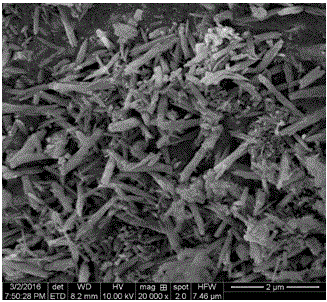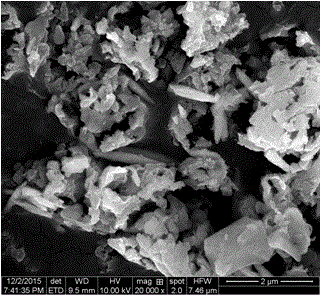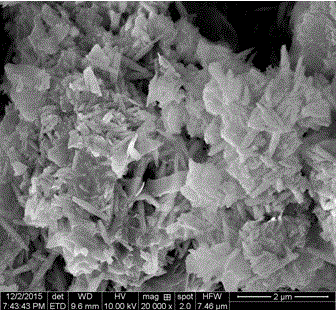A preparation method of silk fibroin-based nano-mofs
A silk fibroin, nanotechnology, applied in the fields of nanotechnology, nanotechnology, nanotechnology for materials and surface science, etc., can solve fields that do not involve the interaction between rare earth ions and silk fibroin macromolecules and their possible applications, etc. problems, to achieve the effects of good biocompatibility and safety, easy availability of raw materials, and simple preparation methods
- Summary
- Abstract
- Description
- Claims
- Application Information
AI Technical Summary
Problems solved by technology
Method used
Image
Examples
Embodiment 1
[0021] Example 1: 0.1 g of silk was degummed by using 40 mL of ethanol-containing calcium chloride aqueous solution (CaCl 2 :EtOH:H 2 O = 1: 2: 8, the reaction temperature is 70 ~ 80 ° C) to dissolve it to clarification, cool, filter with gauze to remove impurities, put the filtrate into a dialysis bag and put it into deionized water for dialysis, dialysis for 3 days, change every day water three times to obtain a silk fibroin solution with a concentration of 2.5 g / L, and slowly add 200 µL Eu 3+ , Molecular self-assembly reaction for 2 days, the solution was turbid, solid particles were formed, filtered out, rinsed repeatedly with deionized water, and dried at room temperature, the preparation was as shown in the accompanying drawing figure 1 The nanostructured silk fibroin-based MOFs material shown.
Embodiment 2
[0022] Example 2: 0.1 g of silk was degummed by using 40 mL of ethanol-containing calcium chloride aqueous solution (CaCl 2 :EtOH:H 2 O = 1: 2: 8, the reaction temperature is 70 ~ 80 ° C) to dissolve it to clarification, cool, filter with gauze to remove impurities, put the filtrate into a dialysis bag and put it into deionized water for dialysis, dialysis for 3 days, change every day water three times to obtain a silk fibroin solution with a concentration of 2.5 g / L, and slowly add 400 µL Eu 3+ , Molecular self-assembly reaction for 2 days, the solution was turbid, solid particles were formed, filtered out, rinsed repeatedly with deionized water, and dried at room temperature, the preparation was as shown in the accompanying drawing figure 2 The nanostructured silk fibroin-based MOFs material shown.
Embodiment 3
[0023] Example 3: 0.1 g of silk was degummed by using 40 mL of ethanol-containing calcium chloride aqueous solution (CaCl 2 :EtOH:H 2 O = 1: 2: 8, the reaction temperature is 70 ~ 80 ° C) to dissolve it to clarification, cool, filter with gauze to remove impurities, put the filtrate into a dialysis bag and put it into deionized water for dialysis, dialysis for 3 days, change every day water 3 times to obtain a silk fibroin solution with a concentration of 2.5 g / L, and slowly add 600 µL Eu 3+ , Molecular self-assembly reaction for 2 days, the solution was turbid, solid particles were formed, filtered out, rinsed repeatedly with deionized water, and dried at room temperature, the preparation was as shown in the accompanying drawing image 3 The nanostructured silk fibroin-based MOFs material shown.
PUM
| Property | Measurement | Unit |
|---|---|---|
| concentration | aaaaa | aaaaa |
Abstract
Description
Claims
Application Information
 Login to View More
Login to View More - R&D
- Intellectual Property
- Life Sciences
- Materials
- Tech Scout
- Unparalleled Data Quality
- Higher Quality Content
- 60% Fewer Hallucinations
Browse by: Latest US Patents, China's latest patents, Technical Efficacy Thesaurus, Application Domain, Technology Topic, Popular Technical Reports.
© 2025 PatSnap. All rights reserved.Legal|Privacy policy|Modern Slavery Act Transparency Statement|Sitemap|About US| Contact US: help@patsnap.com



